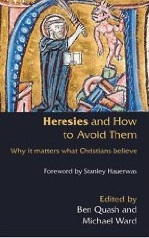
It is an easy temptation to become focused on heresies (or heretics) instead of exploring the reaches of orthodoxy itself. Michael Ward discusses problems with being orthodox.
Hyper-orthodoxy is the desire to defend orthodoxy at all costs and in way one can find. Denominationalism tends toward this. These worry about liberals.
Hypo-orthodoxy is the belief that orthodoxy is bad and needs to be reduced to the lowest possible level. Nondenominational evangelicalism tends toward this. These worry about conservatives.
But this isn’t simply about the via media. Michael Ward, a theologian and writer, argues not only for moderation in all things but also a moderation about moderation itself. Some times one has to take a radical stand.
Excessive balance, then, can be a problem: lukewarmness and an equally fierce rejection of heresy are both mistakes of excessive balance. (I wasn’t sure what Ward was getting at in this point.) One cannot, so it seems to be what he is saying, reject heresy with the same passion as one embraces orthodoxy.
The chief vocation of the orthodox is not to exclude the heterodox, so Ward argues. Excommunication was not always the result; death was very rare. Even Arius — and I didn’t know this — was welcomed back and Athanasius was ordered to reinstate him.
Orthodoxy is imitable and it can lead to hypocrisy; some say the right things but don’t believe them. Orthodoxy can lead not only to hypocrisy but to idolatry: allegiance to the creed can transcend for some the allegiance we owe to God.
Orthodoxy can also lead to barren intellectualism, and I believe the emerging crowd in some ways is responding to folks who say the right things and believe the right things but don’t always live the right things. In fact, apart from the importance — dead importance in fact — of affirming Trinity, I’ve met precious few who even know the implications of Trinitarian faith. Genuine orthodoxy, Ward concludes, is a matter of head, heart, will and deed.
“Truth, first and foremost, is not an ‘it’, not a proposition, but a person, who will always elude over-precise descriptions” (141).

